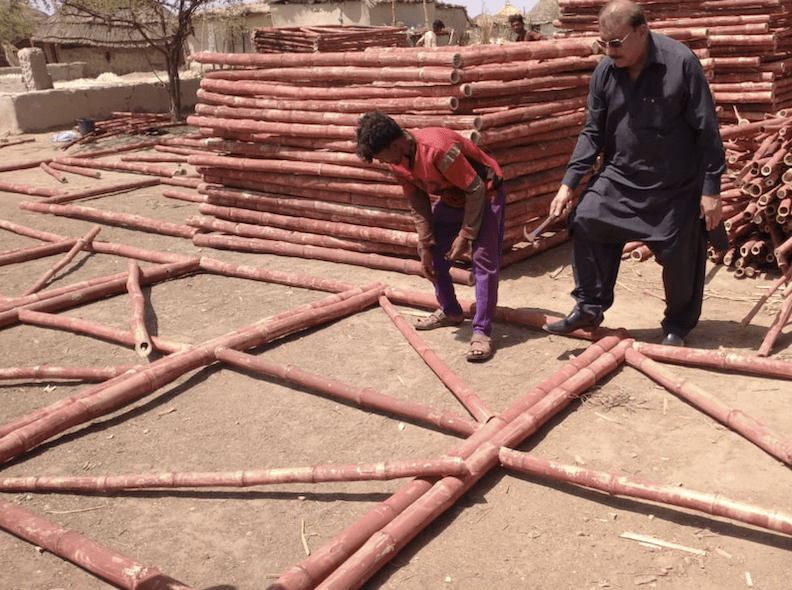By Ariel Miller, ESRAG Newsletter Editor
As the catastrophic 2022 floods devastated the homes, health, and livelihoods of over 33 million Pakistanis, the United Nations Environment Programme and the OECD warned that the growing gap in climate aid is accelerating humankind’s existential danger. The Brookings Institution reported in February, 2023 that 90% of the flood recovery aid committed at the January international donors’ conference in Geneva is in loans, a crippling additional burden for a national economy that was already reeling before the flood. But Pakistani Rotarians, led by RI Director Muhammad Faiz Kidwai, are demonstrating how Rotary’s unique combination of local knowledge and international aid and support can speedily deliver and effectively administer grants to impoverished communities, creating hope and transformation.
Launched in March by Pakistani clubs who are each sponsoring a destroyed rural village, Kidwai’s Smart Village program embodies best practices by combining climate resilience, sustainable development, and gender equity. The benefits will endure and grow. By leveraging local skills and resources, the plan is thrifty and financially sustainable. Its multi-year, modular design is perfectly sized for overseas Rotary clubs to sponsor a specific number of households as the project works in partnership with local people to build a vibrant future.
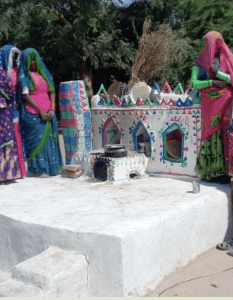
Traditional stove mounted on a platform to withstand future floods
“Central to our mission is the recognition of indigenous knowledge and materials,” writes Faiz Kidwai. “We believe that by working closely with indigenous communities, we can learn from their rich cultural traditions and develop sustainable solutions that are rooted in their unique ways of life. Our vision is a world where sustainable living, innovation, technologies, and indigenous skills as well as locally available resources are integrated into every aspect of society. We are committed to working towards the future by fostering collaboration, promoting and advocating for policies that support a sustainable and just world for all.”
Kidwai, an architect, has been refining this strategy with a concept earlier initiated by his colleague, the legendary architect Yasmin Lari, through waves of disasters over many years. In collaboration with Yasmeen Lari’s Zero Carbon Program and other partner organizations, the Rotary Pakistan Smart Villages Program has been finalized and initiated with at least 20 villages of 100 families each by June 2024.
When record-shattering monsoons and snow melt flooded a third of the country last year, Kidwai and Lari combined their field-tested experience to build a plan through which Rotarians can help close the gap between international pledges and Pakistan’s damage, estimated to be at least $USD 30 billion. Lari’s elevated bamboo structures in a Pakistani surroundings emerged intact after being deluged in the unprecedented 2022 floods. These designs will be used for essential community infrastructure including health and vocational training centers in the new Smart Villages.
Here’s the challenge, and here’s Kidwai’s and Lari’s evidence-based strategy to surmount it.
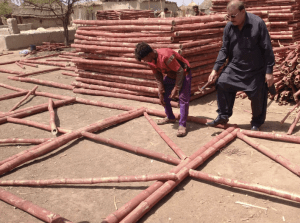
D 3271 PDG Raees A. Khan, who’s monitoring the implementation and quality control for Smart Villages, is helping a child assemble new houses using Pakistani bamboo.
In April, 2023, 20% of Pakistan’s flooded villages were still under water, with countless people still living in tents, their livelihoods destroyed, struggling to survive surges of malaria and dengue. Shelter and safe water are the first priorities. Smart Villages Phase I helps villagers build homes using lime and traditional materials – mud bricks and bamboo – which they make or grow themselves. These are carbon-neutral or carbon-sequestering materials with health co-benefits including passive cooling and mold inhibition.
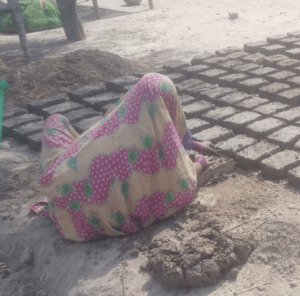
Making mud bricks.
An eco-toilet will be provided to every two homes. On elevated plinths, villagers are constructing hand pumps and traditional water stands that use sunshine to disinfect water. Training in this phase builds on the expertise local people already have.
Phase II focuses on using flood-resilient designs and the same local materials to add a health center and a community and vocational training center. It will also combine nature-based solutions with technology villagers haven’t had before – such as water treatment incorporating constructed wetlands. Villages will gain appropriately-chosen local renewable energy (solar, wind, or biogas using dung), and new systems to conserve aquifers and provide drip irrigation.
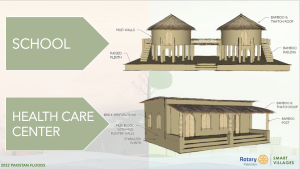
The new community facilities will combine traditional construction materials with elevation to make them flood-resilient.
Phase III catalyzes community economic development by training women and girls to use traditional crafts as the basis of their own business. They will use cellphones to bypass middlemen, increasing their profits by getting products directly to retailers. Kidwai has won the partnership of Pakistan’s leading social welfare NGO, the Saylani Welfare International Trust, in developing smart villages, and with the Akhwat Foundation to provide interest-free micro-loans to these women-owned businesses. The economic development phase will also provide support to enhance farmers’ cultivation skills through drip irrigation and introducing indigenous trees and plants. It will also provide support for cattle farming through appropriate interventions including better techniques and value addition, including guidance on by-products. Interest-free micro-loans will be available for all of these new endeavors.
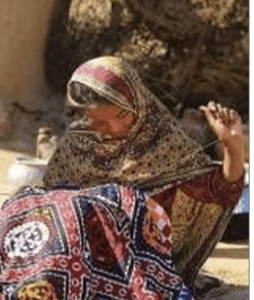
Embroidery is one of the exquisite traditional crafts women can use as the basis for successful business.
Noting that 66% of Pakistan’s rural workforce is female, Kidwai sees “womenomics” as the heart of the plan’s potential to create vibrant rural economies. Project Drawdown cites the education of girls as one of the highest-impact climate solutions, but the OECD reports that climate-focused overseas development aid (ODA) with gender equality as the primary goal “is nearly nonexistent: in 2018-19… a little over 0.04% of all climate-related ODA.” Pakistani Rotarians are setting a powerful example to other funders by addressing this gap.
RI President-Elect Gordon McInally toured the flooded regions of Pakistan last fall with RI Director Kidwai, and was shattered to see the suffering caused by the 2022 climate disaster. Speaking months later to Rotarians at the March 2023 BASRAN Conference on tackling pollution of the Baltic Sea, McInally cited the injustice that “the way we are behaving at present” in other countries has imposed such huge losses on Pakistan, which generates such a
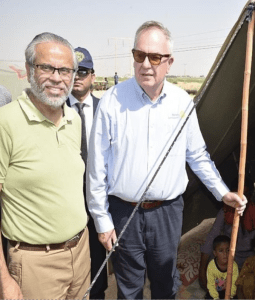
RI Director Faiz Kidwai and RI President-Elect Gordon McInally about to visit a family whose home was destroyed by the floods.
tiny share of greenhouse gas emissions. He called on Rotarians to create hope in the world by embracing environmental action.
The Smart Village initiative is a superb opportunity for Rotarians to make grants on a scale your club can afford, and, by doing so, to witness the impact of best practices combining climate solutions, sustainable development and equity. RI Director Kidwai is the founder of Rotary Pakistan Smart Villages, with RI Trustee Aziz Memon as its Chief Patron and PDG Saifullah Ejaz Chouhdary as its National Chair.
Faiz Kidwai and other leading Pakistani Rotarians are already meeting by Zoom with clubs in the UK and US and are glad to make a presentation to your club or district. To set up a meeting or a presentation, email him!
Pictures and drawings provided by RI Director Faiz Kidwai.
